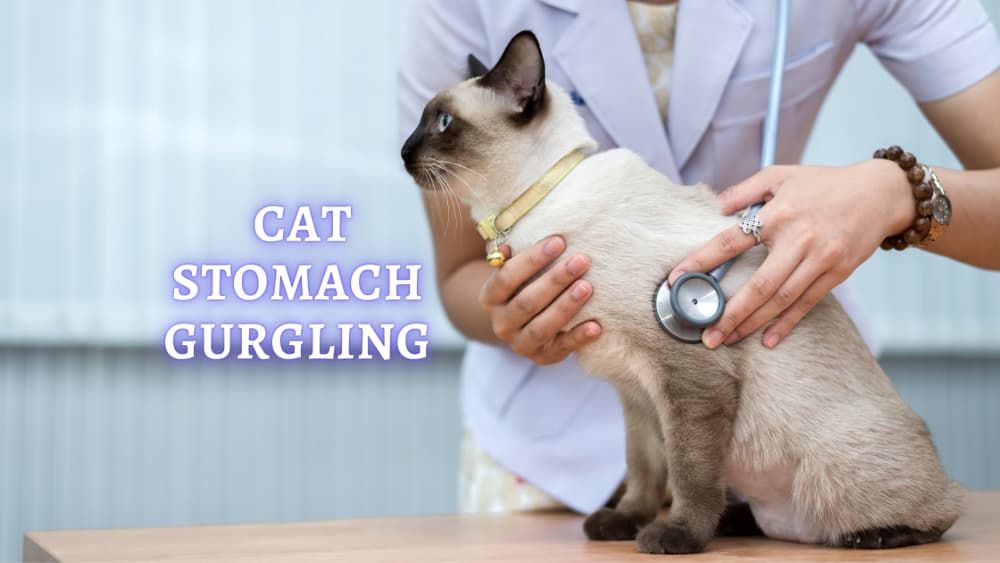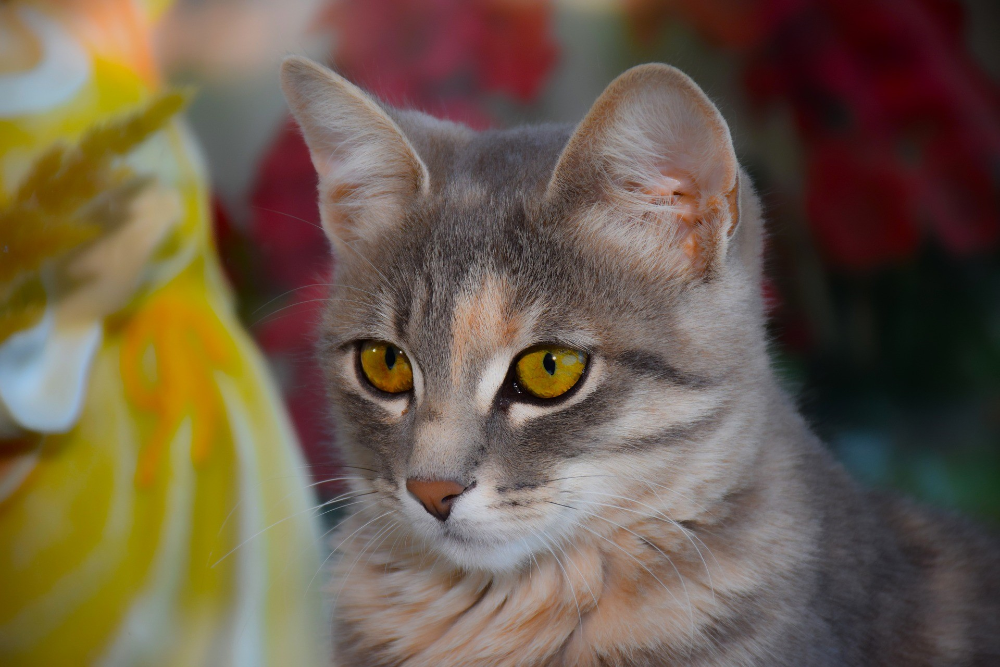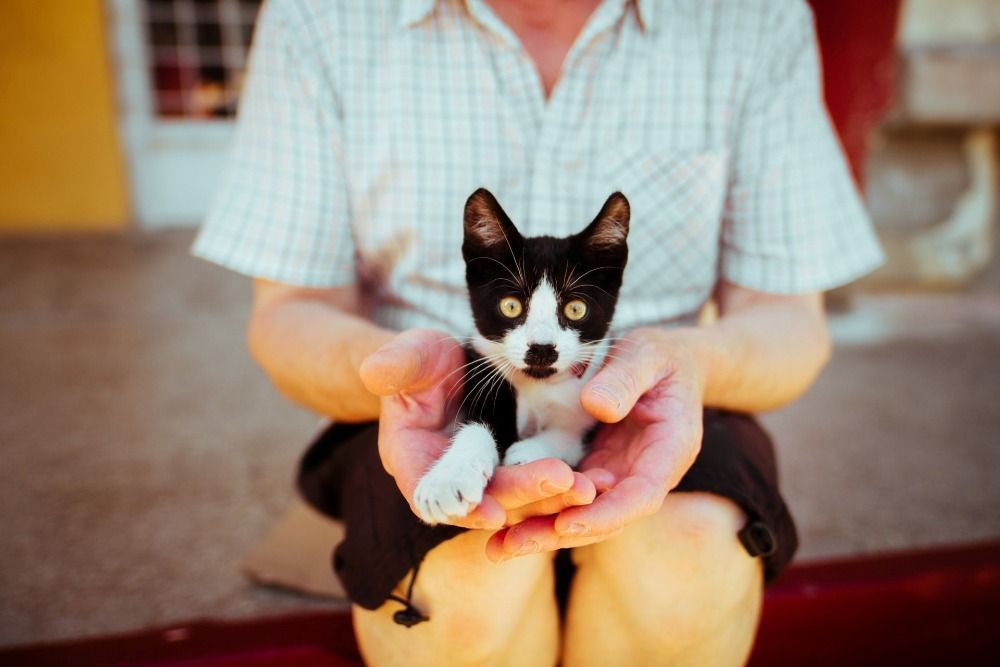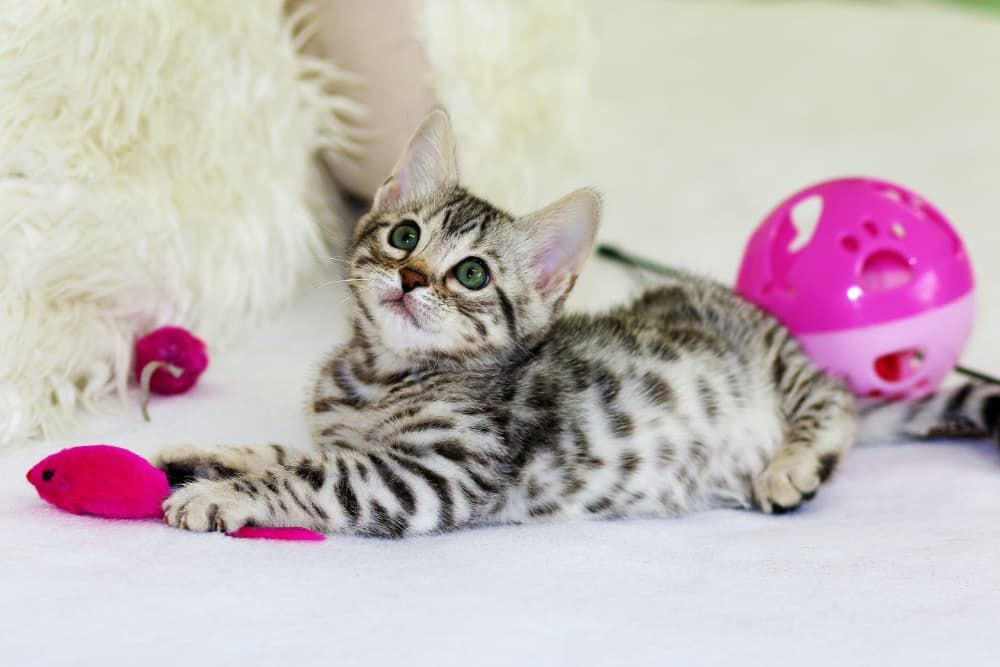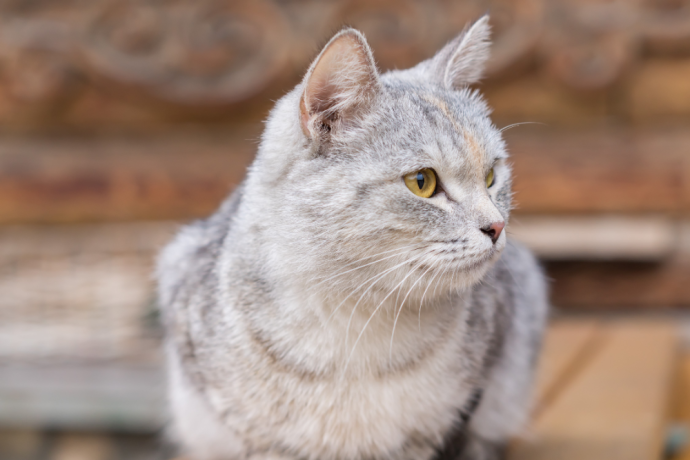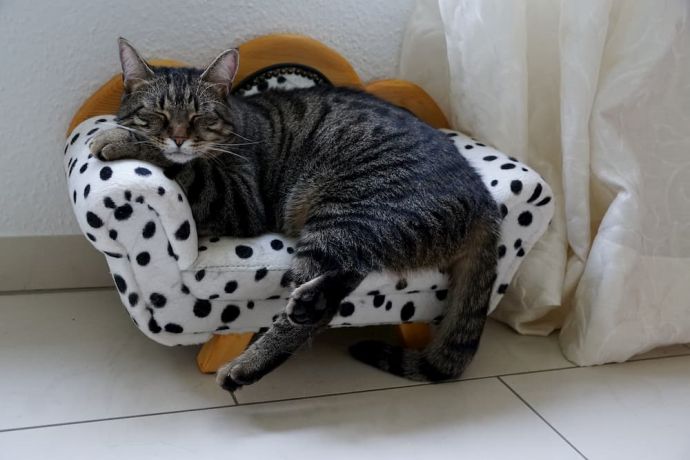Cat Stomach Gurgling: Vet Advice on Why is Your Cat Stomach Gurgling?
Written by:
Author: Dr. Kathryn Dench
Dr. Kathryn Dench is an experience veterinary with over 10 years' experience in small animal and exotic pet medicine. Kate qualified from Cambridge University Veterinary School in 2007. Kate has worked in a number of veterinary practices in the UK. She has extensive experience in the medical care of pet species, from dogs and cats to chickens and chameleons! In free time, Kate writes pet advice in order to ensure that owners are receiving the best possible information on how to care for their pets.
View all 9 articlesLearn about our editorial process and veterinary review board.
Viewed: 36469
Updated on: 07/10/2023
As with people, it is not unusual to hear the occasional gurgle from your cat’s stomach. But are these bubbly noises always innocent, or could that gurgling sound you hear be a warning of bowel disease? In this article we look at some of the most common reasons why your cat’s stomach might be gurgling, and what you need to do about it.
What are those Noises?
Firstly, let’s look a bit closer at that gurgling stomach. The medical term for the noises you hear is borborygmus. Borborygmus is very normal and natural: it is caused by the movement of food through the digestive system. As solid, liquid and gas particles in the stomach and intestines mix together, it results in a gurgling sound.
The type of noise can vary depending on the contents of the digestive tract. An empty stomach might produce a typical growling sound, while a digestive tract that’s busy working might make prolonged gurgles. Sometimes, you might even make squeaking noises from your cat’s stomach.
While this range of tummy rumbling can simply be a sign that your cat is hungry or digesting their meal, if your cat’s stomach is making noises more frequently or these sounds are accompanied by vomiting or diarrhea, it may be a sign of something more serious.
What are the possible causes of my Cat’s gurgling stomach?
1. Dietary Indiscretion
“Dietary indiscretion” is the formal term for when our pets have eaten something that isn’t good for them, and is the most common cause of stomach problems in pets who have access too outdoors. Pets who scavenge or hunt are most at risk, as the food they find may well give them an upset stomach.
These ill-advised eating habits might cause a straight-forward indigestion if it’s a one-off incident, but repeated occurrences can disrupt the balance of commensal bacteria in the gut. The symptoms may include vomiting and diarrhea, or your cat may just be off-color with a gurgle stomach and some flatulence.
Some cats also have food intolerances, meaning certain foods just don’t suit them and can lead to digestive issues. Watch out for patterns in your cat’s symptoms: for example, if they always have stomach symptoms after you give them your leftovers, your cat may have an intolerance to some ingredients.
READ MORE: Why has my Cat lost his Voice
2. Foreign bodies
One concerning cause of gurgling stomachs in cats is the presence of “foreign bodies”, meaning non-food items that they have eaten. These can become lodged in the stomach or intestines causing an obstruction. Foreign bodies can cause serious damage to the part of the digestive tract where they get stuck, and can even cause a rupture of the gut.
Usually cats with foreign body problems will be quiet because of stomach pain and may be off their food or vomiting. But it is possible for the symptoms to be very mild, and the first sign you notice may just be a gurgling sounds in the stomach. The situation is a very serious one and can be life-threatening, so be vigilant and get your cat checked by a veterinarian if you suspect they might have eaten something they shouldn’t.
3. Parasites
Intestinal worms and protozoan parasites like giardia or coccidia are another common cause of upset stomach in our cats. Some cats can have parasite infestations without showing any signs, others might suffer weight loss, and others can experience vomiting or diarrhea as a result of the parasites. In general the symptoms are more severe if your cat’s system is under stress and their immunity is low, for example if they are unwell with another illness at the same time.
Just because you don’t see worms in your cat’s feces doesn’t mean they don’t have worms — the adult worms live in the intestines and most of the time only microscopic eggs are passed in the feces. [1] So if your cat’s stomach is gurgling, or they are experiencing other symptoms related to their digestive tract, speak to your veterinarian about a good worming medication, and make sure you give it routinely following the advice of your vet.
READ MORE: Food for Overweight Cats Reviews
4. Infection
Apart from parasites, there are a number of bacterial and viral infections that can cause upset stomachs in our pets. The symptoms can range from mild diarrhea to life-threatening dehydration, depending on the cause of the infection and the strength of your cat’s immune system.
As these infections are usually passed from cat to cat, most cats with access to outdoors have the potential to be exposed to these bacteria and viruses. Fortunately vaccines have been developed against the most serious of these infections, and your veterinarian will be able to recommend which vaccines are needed for your cat based on the prevalence of specific infections in the area where you live.
Salmonella infections can also cause stomach problems in cats eating raw chicken, [2] so if you are feeding your cat raw meat or bones as part of their diet, make sure you are following the best safety and hygiene recommendations. [3]
5. Inflammatory Bowel Disease
Some cats suffer from inflammatory bowel disease (IBD). This is a condition that usually affects older cats, where the walls of the intestines are hypersensitive and can flare up with inflammation at the slightest trigger. This inflammation disrupts the normal processing in the guts, and can cause excess fluid or gas in the intestines. If your cat has IBD, you will notice unusual stomach noises and some vomiting or diarrhea. For some cats, the symptoms are as mild as just bringing up hairballs more often than usual.
Unlike in other species, an inflammatory bowel problem in some unlucky cats occurs as part of a condition called “triaditis”, where the “triad” is made up of the intestines, bile duct and pancreas. [5] When all three of these digestive organs get inflamed at once, the result is a very sick cat with a painful abdomen.
If your cat is showing symptoms of IBD, you should arrange an appointment with your vet. Severe cases of IBD, especially if it is part of triaditis, will need careful treatment and supervision from the vet while they get the episode under control. In mild cases, your vet can recommend a special diet to manage your cat’s IBD, designed to stop the intestines from flaring up. [6]
READ MORE: Where to Put Cat Litter Box
6. Metabolic disorders
Sometimes, a gurgling sounds in stomach is a symptom of disease in a different part of the cat’s body. That’s because these conditions have an impact on a cat’s metabolism, which in turn affects how fast they process food and the way their guts sound.
Hyperthyroidism is a disease where the thyroid gland in the neck produces too much thyroid hormone. [7] Thyroid hormone controls our metabolism, so too much of it makes the body’s metabolic rate very high. Typical symptoms in cats include a fast heart rate, being “on edge”, weight loss and continuous hunger. The digestive system is moving food through so fast that a gurgling noises in stomach is a natural consequence.
Hyperthyroidism is a serious condition: not only can the weight loss be dangerous, but the extra strain on the heart can be fatal. So if your cat’s growling tummy is accompanied by the other symptoms of hyperthyroidism, it’s a good idea to speak to your vet.
Although not the primary symptom, a cat’s stomach making noises can also be a symptom of other metabolic diseases such as kidney disease. Cats with kidney disease often drink and urinate more than usual. You may notice weight loss and your cat might be vomiting or have diarrhea. If your cat has this combination of symptoms or you are concerned that their kidneys might not be working properly, you should get your cat checked at the vet clinic.
READ MORE: Best Automatic Cat Feeder
What should I do if my Cat has a bad Stomach?
It is worrying when our pets are sick. One of the biggest dilemmas can be whether to we’re best to look after them at home or rush them to the vet. Here are our suggestions, depending on the symptoms your cat is showing.
READ MORE: How to tell if my Cat is Sick
Gastritis
A cat who is vomiting is at risk of dehydration, as well as missing out on nutrients because they aren’t holding down their food. If your cat is very lethargic, unwilling to respond to you when you pet them, or you notice blood in their vomit, you need to take them to a vet straight away.
If they are otherwise bright in themselves, here are our top tips to help a cat who is experiencing an episode of vomiting:
- The first step is to withhold food for eight hours to give the stomach a rest. Your cat should still have access to room-temperature water (not too cold, as this can also irritate the stomach).
- If the vomiting settles, you can start re-introducing food after 8-12 hours. Start with bland food, such as grilled or boiled chicken or white fish, and offer small quantities to start with so that the stomach is not overwhelmed.
- If your cat is unable to keep down fluids, or if they continue to vomit when you start offering food again, you should make an appointment with your vet straight away.
Diarrhea
If your cat has diarrhea but no vomiting, you can take a different approach. The recommendations for handling cat with diarrhea have changed over recent years. The advice used to be to withhold food for 24 hours, but research has shown that the irritated guts rely on nutrients from the food in order to repair themselves.[4] So the current recommendations are these:
- You can withhold food for a few hours, like with a vomiting cat, and then go straight to a bland diet.
- If the diarrhea doesn’t clear up within 1-2 days, or if your cat is showing other symptoms like weakness or being quiet in themselves, then they should be checked by a veterinarian.
Kittens
A special note about our feline friends who are not yet fully grown: kittens with upset stomachs need particularly careful handling compared to adult cats. Their small body size and high metabolism mean they are at extra risk of getting dehydrated and their blood sugar can drop very fast if they don’t eat. Their immune systems are also not as strong when faced with an infection.
- If your kitten’s only symptom is a gurgling stomach, make sure you are feeding them little and often. A kitten’s stomach is so small that they need to eat several times a day to get their full nutrition. An empty stomach is a likely cause for the growling noise you can hear!
- If a kitten vomits or has diarrhea just one time, and is otherwise bright and active, you should not starve them, but just offer a bland diet. If they are still nursing from their mother, do not stop their access to her.
- If the vomiting or diarrhea happens more than once in a kitten, it’s a good idea to see the vet so that their delicate digestive system can be carefully supported.
READ MORE: How much Tuna can a Cat Eat
On the road to Recovery
Once your cat is recovering from their episode of stomach symptoms on the bland diet, it is important not to change the diet too suddenly back to a rich diet, as such changes can in themselves trigger cat’s stomach upset.
- In general it is recommended to feed the bland diet for at least five days, to make sure the bowel has settled fully before making any changes.
- When you decide to start reintroducing your cat’s normal food, make the change gradually over the course of a few days. Start by mixing a little of their normal food into the bland diet for a couple of days, then increasing to a 50:50 mixture, and finally returning to their original diet.
If your cat makes a full recovery with this regime, then hopefully it was just a case of a mild upset stomach. If you notice that your cat has more than two of these episodes in a six-month period, it is worth keeping a note of when they happen and speaking to your vet about it at your next check-up. Sometimes these apparently unrelated events can give your vet useful information when making sure that all your cat’s body systems are working well.
People also ask
Why is my cat’s stomach making gurgling noises?
Grumbling sounds in the stomach are the result of the slow or rapid movement of liquid, gases, and food bolus through the digestive tract. Loud rumbling, gurgling in the stomach, as a rule, is a sign of a violation of the process of assimilation of nutrients at any stage of food digestion.
What can you give a cat to settle their stomach?
As a therapy, the pet in this situation may begin to administer saline solutions, painkillers and carminative drugs in order to reduce the amount of gases that stretch the intestinal loops, thereby causing a situation where the cat gurgles in the stomach.
Why is my cat’s stomach making noises and diarrhea?
There are a number of possible reasons why a cat’s stomach growls: hunger, thirst, irregular feeding, poor-quality or inappropriate foods, swallowing air, worm infestation, or bloating due to diarrhea.
Conclusion
There are a number of reasons why your cat’s stomach might be gurgling. While it is not necessary to panic at the first sound of your cat’s digestive system working, it is sensible to pay attention to your cat’s digestive health. Always speak to your vet if you are worried about your pet’s condition, and be ready to take them to your veterinary clinic if their stomach noises are more frequent than normal or accompanied by other symptoms.
Of course, as with most illnesses, prevention is better than cure. Even if your cat is not experiencing stomach problems, making sure they are up to date with their vaccination schedule and receiving routine preventative parasite medications will help to protect them against these causes of upset stomachs.
Article Sources:
- “Gastrointestinal Parasites of Cats Brochure.” Cornell University College of Veterinary Medicine, 29 Jan. 2018, vet.cornell.edu/departments-centers-and-institutes/cornell-feline-health-center/health-information/feline-health-topics/gastrointestinal-parasites-cats-brochure.
- Giacometti, Federica. “Highly Suspected Cases of Salmonellosis in Two Cats Fed with a Commercial Raw Meat-Based Diet: Health Risks to Animals and Zoonotic Implications.” Paperity, paperity.org/p/194618890/highly-suspected-cases-of-salmonellosis-in-two-cats-fed-with-a-commercial-raw-meat-based.
- “Raw Feeding Food Safety 101, Raw Feeding Guidance, Raw Feeding Pets.” Perfectly Rawsome, 23 Apr. 2019, perfectlyrawsome.com/raw-feeding-knowledgebase/raw-feeding-food-safety-101/.
- “Cat Diarrhea: 5 Treatment Options You Should Try.” PetMD, 22 Oct. 2020, petmd.com/cat/care/cat-diarrhea-5-treatment-options-you-should-try.
- Kilpatrick, Scott. “Feline Comorbidities: What Do We Really Know about Feline Triaditis?” Edinburgh Research Explorer, 25 Nov. 20201, research.ed.ac.uk/portal/en/publications/feline-comorbidities(7995c715-ec40-4357-a2ab-712f18e5970c).html.
- Williams, Krista, and Ernest Ward. “Inflammatory Bowel Disease in Cats.” VCA Hospitals, vcahospitals.com/know-your-pet/inflammatory-bowel-disease-in-cats.
- “Hyperthyroidism in Cats.” Cornell University College of Veterinary Medicine, 23 July 2018, vet.cornell.edu/departments-centers-and-institutes/cornell-feline-health-center/health-information/feline-health-topics/hyperthyroidism-cats.
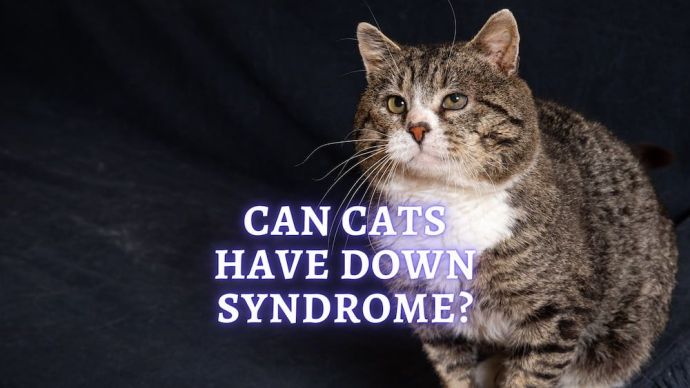 Cat Veterinary Tips Down Syndrome Cat: Can Cats Have Down Syndrome? (Vet Advice)
Cat Veterinary Tips Down Syndrome Cat: Can Cats Have Down Syndrome? (Vet Advice) - 1359
- 0
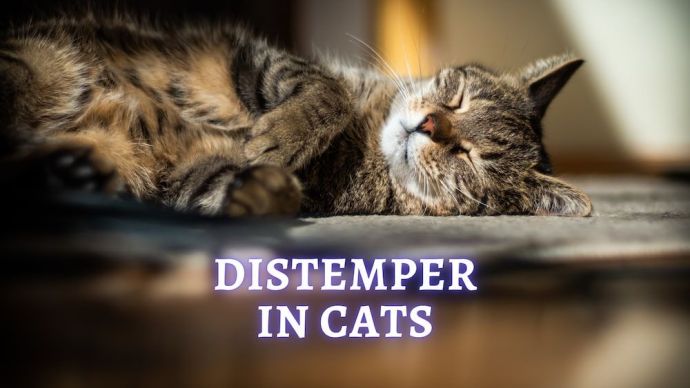 Cat Veterinary Tips Distemper in Cats: What is Feline Panleukopenia? Causes, Signs, Diagnosis and Treatment
Cat Veterinary Tips Distemper in Cats: What is Feline Panleukopenia? Causes, Signs, Diagnosis and Treatment - 298
- 0
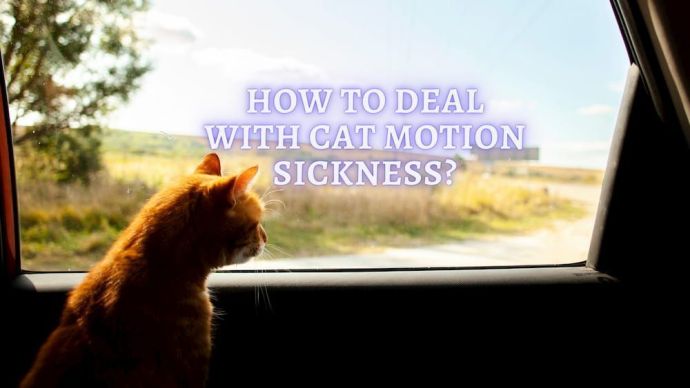 Cat Veterinary Tips Cat Motion Sickness: How to Deal With Motion Sickness in Cats?
Cat Veterinary Tips Cat Motion Sickness: How to Deal With Motion Sickness in Cats? - 765
- 0
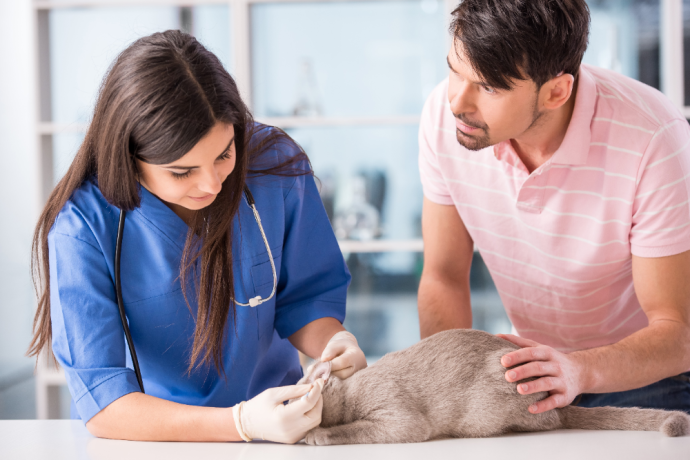 Cat Veterinary Tips Cat Fleas and Ticks: How to get rid of Fleas on Cats? (Vet Advice)
Cat Veterinary Tips Cat Fleas and Ticks: How to get rid of Fleas on Cats? (Vet Advice) - 185
- 0
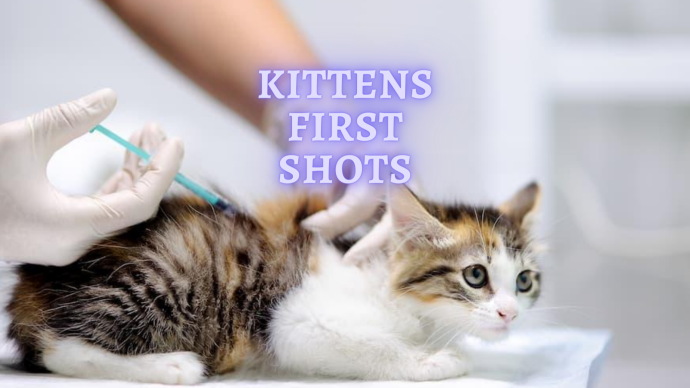 Cat Veterinary Tips Kittens First Shots: When do Kittens get their First Shots?
Cat Veterinary Tips Kittens First Shots: When do Kittens get their First Shots? - 513
- 0
 Cat Care Why Does My Cat Attack My Legs? 10 Reasons Why and What To Do About It (Vet-Approved Advice)
Cat Care Why Does My Cat Attack My Legs? 10 Reasons Why and What To Do About It (Vet-Approved Advice) - 46013
- 21
 Cat Veterinary Tips My Cat Lost its Voice: Can Cats get Laryngitis? (Vet Advice)
Cat Veterinary Tips My Cat Lost its Voice: Can Cats get Laryngitis? (Vet Advice) - 23554
- 13
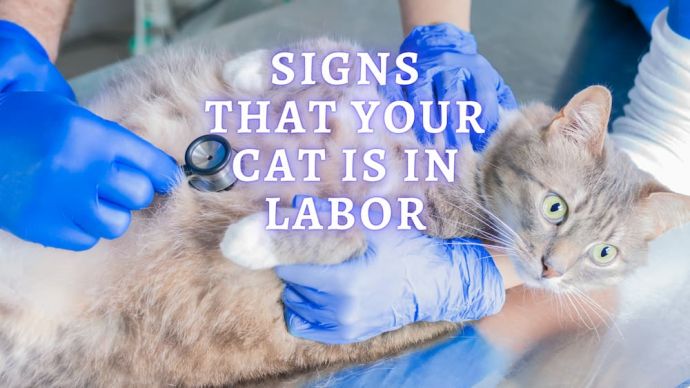 Cat Veterinary Tips Signs That Your Cat is in Labor: How to tell if a Cat is Pregnant?
Cat Veterinary Tips Signs That Your Cat is in Labor: How to tell if a Cat is Pregnant? - 15122
- 1









